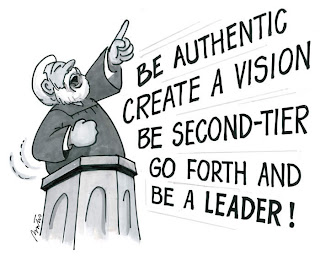I haven't read it (I plan to) but recently, Forbes contributor Steve Denning ran this interesting article about Martin's book titled: The Dumbest Idea in the World: Maximizing Shareholder Value (from a quote attributed to Jack Welch).
Here's how it starts:
“Imagine an NFL coach,” writes Roger Martin, Dean of the Rotman School of Management at the University of Toronto, in his important new book, 'Fixing the Game', “holding a press conference on Wednesday to announce that he predicts a win by 9 points on Sunday, and that bettors should recognize that the current spread of 6 points is too low. Or picture the team’s quarterback standing up in the postgame press conference and apologizing for having only won by 3 points when the final betting spread was 9 points in his team’s favor. While it’s laughable to imagine coaches or quarterbacks doing so, CEOs are expected to do both of these things.”
According to the article, Martin argues that there are two markets - the 'real market' where real dollars show up on the bottom line - and the 'expectations market' ie, the stock market where dollars are traded and made based on how near or far a company is to meeting it's investor expectations.
Martin's point is that there is far more incentive for CEO's to manage the expectations market than there is for them to succeed in the real market. So managing companies becomes all about managing expectations, not about building businesses.
I agree.
Even in my modest tenure of running a too-small public company for five years, I quickly came to understand that running a business well - and running a public business well - were two completely different beasts. I frequently said to people around me that we made decisions running a public company that we would NEVER have made if it were private.
Martin goes on. He argues, according to Forbes, that "we must shift the focus of companies back to the customer and away from shareholder value”. "If you take care of customers, shareholders will be drawn along for a very nice ride.", quotes Forbes.
I don't disagree with Martin - how can you?
It seems to me (here it comes) that there might be no greater evidence that his argument is correct than the value that RIM created up to mid-2008 when customers embraced their smartphone/mobile e-mail invention and subsequently destroyed by ignoring customers evolving expectations thanks to the launch of the iPhone.
Given Martin's point of view, one has to assume that he is working feverishly in the background at RIM - clearly not to manage expectations, but to ensure that management truly understands what customers want - and is skillfully building an operating system and new hardware to capitalize on it.
I keep thinking that Martin (and others associated with RIM) need(s) to be careful.
His book may be great, but if RIM doesn't turn around it will forever be the asterisk on his reputation*.
*had great ideas, even wrote a good book - but failed to execute




No comments:
Post a Comment